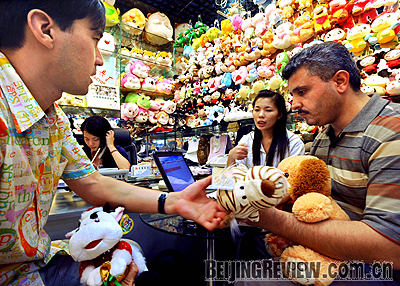|
|
 NEW BUYERS: Businesspeople from the Middle East purchase toys at Yiwu International Trade City. Yiwu's exports to the Middle East have increased as demand in Europe and the United States has dropped because of the global economic crisis
NEW BUYERS: Businesspeople from the Middle East purchase toys at Yiwu International Trade City. Yiwu's exports to the Middle East have increased as demand in Europe and the United States has dropped because of the global economic crisis |
Hongye Cartons Packing Salesroom in Yiwu sells carton packages just across the street from Yiwu International Trade City, a mammoth wholesale center whose acreage is three times that of Terminal 3 of Beijing Capital International Airport, selling everything from blue jeans and buttons to small home appliances and clay pots. The cartons are mainly used to pack commodities sold at the center, where traders from other parts of China and abroad buy products in bulk and ship them to other locations for sale. Before the economic crisis, Hongye's daily sales could reach 5,000 yuan ($730), but now they only total about 2,000 yuan ($293).
Yiwu in Zhejiang Province is the largest market in the world for small-scale commodity wholesalers. More than 60 percent of its commodities are exported to 215 destinations, according to the Yiwu Municipal Government. The city's economy depends on exports. It is no surprise then that many export-related businesses are inevitably feeling the cold wave brought about by the global economic crisis, which has significantly reduced overseas demand for Chinese exports.
The China Yiwu Commodities Index, a weighted index compiled by the Ministry of Commerce that reflects the trading condition of consumer goods in the country, stood at 1,035.82 points in November, about 21 points lower than the previous month for a decline of almost 2 percent. The year-on-year decrease was 10.77 percent, or 124.98 points. At the same time, the city's business confidence index was 139.93 points, 4.51 points lower than October, but 3.83 points higher than the same period last year. Data from the Yiwu International Logistics Center shows that in November, the city's cargo transportation volume was 19,898 standard containers, a decrease of almost 19 percent over the previous month.
Various businesspeople in Yiwu have reported production and sales declines that support these figures. Luo Huawen, Chairman of the Yiwu Watch and Clock Association, said that although the economic crisis had not markedly affected the watch and clock industry in September and October, the impact has gotten worse since November.
"Many orders cannot be delivered, and there's no overtime production in factories," Luo said.
Likewise, Ren Anxin, who runs the Kaili Toys Factory and rents a stall at International Trade City, says his factory, which mainly produces vinyl toys, received few orders in November. He said beginning in July, the transport of chemical materials needed to manufacture vinyl toys was strictly regulated to ensure safety during the run-up to the Olympic Games in Beijing, restricting his company's production. Ren, whose stall is just beside the main aisle at the trade center, said he also has seen a marked decrease in the flow of customers there.
Other toymakers say they are experiencing tough times as well because of the global economic downturn.
"The business volume of the toy industry at the International Trade City has declined over 20 percent in recent months," said Zhang Changzhou, Chairman of the Toys Trade Council of International Trade City.
Yang Wanlin, a phone-card vendor whose stall is on Exotic Street, which is full of restaurants to feed foreigners, has seen a similar situation.
|
